- Home
- J. G. Ballard
The Day of Creation (Harper Perennial Modern Classics) Page 5
The Day of Creation (Harper Perennial Modern Classics) Read online
Page 5
I waited as the tractor rumbled forward, its treads easily straddling the cavity below. As the sergeant headed towards the forest path I walked down the earth ramp and peered into the open mouth. Scores of torn roots emerged from the ground-soil, the crop of a strange subterranean plantation. To my surprise, however, a small pool of water had appeared at the base of the cavity. As if leaking from the amputated roots, the dark liquid slowly covered the sandy floor, the last sap of the dead oak irrigating its own grave.
All too aware of the irony that I had at last struck water, I gathered the loose soil between my feet and swept it into the cavity. But the water was already several inches deep, fed from some underground stream, part of an artificial reservoir, I assumed, created by the construction of the airstrip. I gazed down, seeing my own face reflected in the black mirror from which the dead roots of the oak rose to greet me. I kicked a last shower of earth into my reflection and strode down the remains of the ramp, following one of the parallel pathways left by the tractor.
Fifty yards into the forest, I stopped to wait for the tractor’s smoke to dissipate through the trees. Looking back, I could see the pattern of metal tracks stamped into the long bracelets of soil that led to the airstrip.
A thin stream of water, little more than the width of my arm, flowed along the track, carried by the slight gradient that ran down to the lake. While I waited, it crept towards my heels and touched them, moving in a zigzag of lateral and forward movements that seemed to notch up a series of coded messages, computerizing itself around my feet.
An hour later, as I stood on the jetty beside the police barracks, above the beach where the twelve-year-old had tried to kill me, I saw the stream emerge from the forest and make its way down to the drained bed of the lake. It formed a small pool beneath the debris along the beach, nudging at the cigarette packs and beer cans which were already floating on its surface, as if trying to stir this dusty rubbish into a second life.
7
The Impresario of Rubbish
Behind my back, a mirror was forming. All morning, as I worked among the packing cases in the looted clinic, I was aware of the vivid reflection from the lake, as if someone had switched on the underwater lights of a swimming pool. For reasons of its own the sun had come closer to Port-la-Nouvelle, perhaps intrigued by the appearance of this dark water that had spent so many aeons within the earth.
Resigned at long last to closing the clinic and returning to England, I tried to ignore the lake and the line of drilling rigs. Harare’s guerillas had ransacked the dispensary, stealing at random from the drug cabinet in my office, scattering powdered milk over my desk and crushing scores of glass vials under their feet. I swept the debris into the yard, and packed the last of the medical supplies into a suitcase with the few clothes that Harare’s soldiers had left me.
At dusk the previous evening, when I opened the door to the trailer, I first thought that the guerillas had detonated a hand grenade as a farewell present. Exhausted after the hours in Harare’s custody, and the tomfoolery of Sanger’s mercy mission, I cleared a space in the heap of clothes, books and crockery, pulled the mattress from below the upended refrigerator, and fell asleep as Captain Kagwa’s men patrolled the deserted town, playing their radios through the darkness of the surrounding forest. Twice I was woken by the sounds of gunfire, and heard the explosions of mortar shells in the tobacco farms, as the rival forces shifted the furniture of the night.
All in all, it was time to go. My short career as hydrologist – an absurd venture from the start – had been part of the same curious obsession that had brought me to central Africa in the first place. After a childhood in Hong Kong, where my father had been a professor of genetics at Kowloon University, I was sent to school in England, and then graduated from Trinity College, Dublin. Although a qualified physician, in the ten years that followed I had gone to any lengths to avoid actually practising medicine in either Europe or North America, whose populations, it eventually became clear, had failed to be sufficiently ill to meet certain bizarre needs of my own – in Europe, I argued dubiously to myself, most of the sick were physically in better health than many of the healthy in Asia. I became editor of a specialist medical journal, and then the so-called research director of a small pharmaceutical company, in reality its publicity manager and Fleet Street lobbyist. One day, while lecturing to a paediatric conference on the merits of a new infant cough linctus, I recognized a fellow Trinity student in the audience, now a child neurologist at a state hospital. In his eyes I saw myself as he saw me, a drug company salesman beginning to believe my own patter.
Three months later I joined the World Health Organization, and by a roundabout route – Toronto, Puerto Rico, Lagos – I found myself in central Africa. After six months in northern Nigeria, trying to isolate a suspected outbreak of smallpox – a disease which WHO had eliminated from the world – I began to forget my uneasy life in London, although it seemed ironic that I should find fulfilment in an unnecessary struggle against an imaginary disease. But I was then transferred to the Central African Republic, still devastated after the rule of Bokassa, and finally sent across the border to the former French East Africa. Yet even in Port-la-Nouvelle I was never happier than when I embarked on the futile drilling project. Lying in my derelict trailer, I knew that it was time to return to England before I could discover why.
When Captain Kagwa called to see me soon after daybreak, I told him that I was closing the clinic and would leave Port-la-Nouvelle whenever he could provide me with transport.
‘My regrets, doctor.’ He gazed at the shambles in the dispensary, and at the blood stains on my hand and legs. With only a few bottles of drinking water, there had been no means of cleaning myself. Clearly he was relieved to see me go. ‘Six months at Port-la-Nouvelle, and so little achieved. You cannot even play your national anthem. However, I can arrange your flight with Air Centrafrique. The Dakota returns today.’
‘So soon? Hope comes and goes. That doesn’t say much for Professor Sanger’s concern for the starving.’
‘The journalists are restless – perhaps they feel disappointed here.’
‘I can understand. Now about the plane. Thank you, Captain, but no – I don’t trust that Dakota. The thought of being incinerated at the end of a runway my tractor helped to build is bad enough, but being strapped into the seat next to Sanger when it happens …’
‘Charity, doctor – or, if you prefer, self-interest – besides, Professor Sanger is not leaving with you. He is to stay here and make me famous. This very morning he will interview me on our local television station.’
‘Our local what …?’ I stared with wonder at Kagwa, aware now of the source of his good humour. Cool and confident, he was resplendent in a freshly pressed uniform, as if about to be promoted to General of Police by the President himself. ‘This is obviously an important interview. To whom will it be transmitted?’
‘To Port-la-Nouvelle and the Lake Kotto area, doctor. Professor Sanger has all the latest equipment – he isn’t drilling for water in a desert. A large part of Lake Kotto is within range of his station. His local antenna has a ten-mile radius.’
‘A new career for you, Captain.’ I could see that the absence of an audience mattered nothing to Captain Kagwa. No doubt he had his own reasons for keeping Sanger in Port-la-Nouvelle, probably to publicize his bush war against the guerillas. ‘This means that Sanger will be staying on at Lake Kotto?’
‘Of course – he has his mission to perform.’
‘His fifty sacks of rice? Do you think that’s his real reason for being here?’
‘You’ve become too suspicious living with us. What else?’
‘He could be working for French Intelligence – or even Harare …’
‘That’s dangerous talk, doctor. It’s small-minded of you. I think it’s time for you to go.’
‘All right. I’ll take that mercy flight after all.’
‘Be at the airstrip by twelve noon. It’s a shame, doc
tor. Professor Sanger tells me that the world is hungry for a new Schweitzer … All those keyboard exercises will have gone to waste.’ Kagwa gazed at the strange light over the lake, and shook the powdered milk from his boots. ‘What will you do when you return to England, doctor? You won’t be happy there.’
‘I dare say I’ll find some dry wells to drill … See you at the plane, Captain.’
An opal light lay over the lake, and transformed the surface of white sand and fish bone into a faint mother-of-pearl. As I stood outside the clinic with my two suitcases I saw a fleeting mirage, a second forest that hung below the first. The undergrowth and the canopies of the shabby oaks were more vibrant, perhaps bathed in the televised aura of Captain Kagwa being transmitted at that very moment from the airstrip antenna, preparing the local flora and fauna for the electronic world order to come. Perhaps Sanger had stumbled upon a method of reviving the flagging agriculture, a new fertility rite for the television age. Along the borders of Chad and the Sudan, the images of provincial leaders and local police chiefs would be broadcast to the arid sand. Already I could see the colossal spectre of Captain Kagwa beamed out like the electronic statue of a new Ozymandias …
A cloud of grit swept against my legs as one of the police trucks stopped outside the barracks before returning to the airstrip. A suitcase in each hand, I walked between the bullet-riddled fuel pumps on the Toyota forecourt. Swinging my cases on to the tailgate of the truck, I told the teenage driver that I would walk to the airfield.
Beyond the garage was a looted appliance store. Captain Kagwa’s sergeant emerged from its office with two soldiers. Between them they carried a large video-recorder, which they handled with the respect due to an ancient tabernacle, and bore swiftly into the barracks.
When they had gone the town returned to its silence. The cooperative factory which had once produced cotton textiles, soap and beer, and the small assembly plant for cheap motor cycles and radios stood dustily in the heat. The streets were empty, as if the entire population were indoors watching television, and reminded me of those English suburbs which I had fled, where on a summer’s afternoon everyone would sit behind drawn blinds watching a tennis final or a royal wedding. Captain Kagwa had made the ultimate leap forward, dispensing even with the need for an audience.
But I was searching for a different kind of magic. I stepped on to the beach below the wharf of the tobacco warehouse. Again I saw the mirage along the shore, the same illusory forest that hung among the clouds of mother-of-pearl. Then, as I touched the lake-bed, I realized its source.
The lake was damp. My cleated boots left firm imprints as sharp as those scored into the forest trail by the tractor. The fire at the cigarette factory had been put out by Kagwa’s soldiers, and now that the smoke had faded the vivid light over the lake was undimmed. The surface gleamed like a salt flat still moist after a few minutes of rain.
As for the mirage, I could see the inverted forest even more clearly, the high canopies of the jungle oaks reflected in a shallow pool of water, two hundred feet in length and some thirty wide, that lay along the beach. Even now this narrow crescent had attracted a few birds. Parties of jacanas and plovers stood in the water, pecking at their reflections.
Had my wells at last reached the water-bearing strata below the lake, tapping the giant aquifer that would carry a third Nile into the Sahara? I ran through the damp sand towards the nearest of the drilling rigs.
The footsteps behind me were already filling with a clear fluid. I reached the rig and rested against the wooden frame. Looking down into the bore, I felt a curious relief that the well was still dry. I pressed my head against the fire-scarred platform, staring at the charred timbers that had fallen from the derrick. The water which had moistened a small corner of Lake Kotto had come from the spring beside the airstrip, whose mouth the tractor had opened the previous afternoon.
Why did I feel so strong a sense of relief? In part, it would have been galling to leave Port-la-Nouvelle and then find that Captain Kagwa or, even worse, Professor Sanger, was taking credit for the successful drilling operation. When I reached the crescent pool I stopped within a few feet of the water’s edge. It seemed an alien element, with its clear geometry conforming so agreeably to the contours of the shore-line, containing nothing in its shallows but concealing everything, like the eyes of the adolescent Chinese girls I had pursued so keenly in Hong Kong.
A jacana waded past me on its overlarge claws, leaving ripples like the spoor of submarine flight in the forest canopy that loomed from the reflection. Fifty feet away, the mouth of the stream emerged from the forest. Little more than a small drain, it leaked a trickle of clear water into a shallow gutter that crossed the road and flowed down to the lake.
I stepped into the pool and washed the dust from my boots, then knelt down and bathed my face and hair, aware that this might be the last useful task to be performed by the small reservoir before it evaporated. Days had passed since I had taken my last shower, and the white dust shed itself from my arms and chest, revealing a second, darker skin. Looking down at the surface, I was surprised to see that it teemed with life – water-spiders flickered to and fro, fishing for the swarms of hydra and infusoria. Microscopic creatures glimmered in the turbid water, as if generated from the sweat and dust of my skin. I seemed to have sloughed away the older, desert version of the up-country physician I had become for a younger, riverine self. Seeing my slim face and shoulders – the product of a poor diet and intermittent dysentery – I remembered the boy of eighteen who had taken a last eccentric sail trip to the mouth of the Canton River, before reluctantly agreeing to my father’s wish that I study medicine, and had spent three days marooned on a rocky headland with several hundred screaming gulls for company.
Refreshed by this cool bath, I climbed the beach and stood on the forest road. Then, almost without thinking, I began to kick the sand into the mouth of the stream. The water backed up behind the dam, forming a small pond which soon disappeared into the dust.
Pleased with myself, in an absurd way, I strode forward through the trees. It was childish of me to have blocked the stream but I had created the spring the previous afternoon. Before I left I would warn Kagwa to replace the root-bole of the old oak, or the seeping water would undermine the airstrip.
My feet slipped in the damp undergrowth between the trees. Confused by the darker air below the canopy, I had strayed from the forest road. I blundered among the ferns and palmettos and fell to my knees in a pool of black water. I assumed that this was a stagnant channel, but even as I crouched there, shaking the mud from my hands, I could feel the pressure of a current against my legs.
I was standing in a jungle stream more than ten feet wide. It flowed through the trees, hidden by the dead lianas and debris of the forest floor. For some fifty yards it followed the road, and then swerved into the brush, seeking out the darker gradients that ran down to the lake.
As my eyes sharpened, I saw that the original stream had divided into several channels, only one of which had so far reached the lake. The others pooled in the hollows, seeping between the fallen trunks and turning the forest into a sombre bayou.
I returned to the forest road and set off towards the airstrip. I felt elated but vaguely guilty, and remembered a childhood visit to Kowloon with my parents, when I had broken the earth dyke that held the water within a small paddy field in the hills of the New Territories. By the time I returned to my mother and father, setting our picnic beside the parked car, the escaping water had run down the hillside and was washing the car’s wheels. Puzzled by the shouts of the farmers from the rice terraces above, my parents set off through the valley for another picnic site. It had taken hours for the moisture on the tyres to dry, hours of nervous excitement and small-boy guilt …
However, I already realized that this stream running through the forest would be a boon to Port-la-Nouvelle. Calming myself, I stepped from the trees at the eastern end of the airstrip. One of Kagwa’s sentries stood by the runway
, rifle slung over his shoulder, throwing pebbles into the shallow brook that ran among the tree stumps and hillocks of the waste ground. He stared at my drenched clothes and muddy arms, as if I were a plumber who had just released some infernal stop-cock in the earth’s cistern.
I climbed the shoulder of the runway, following the stream’s course. The huge root of the forest oak lay beside the cavity from which the tractor had dislodged it. The black bull’s head, like the crown of a minotaur with its snake-like roots, the primal deity of the river, was now covered by a swirl of brown water, beer cans and aerosol cylinders. A steady current moved among the mounds of earth, flowing from a secondary source in the overgrown terrain to the north of the airstrip. Two hundred yards away, a small arm of the stream moved through the scrub, its green back already attracting two kingfishers that leapt from branch to branch of a baobab tree. By dislodging the dead oak from its bed, I had released a flow of water from an underground reservoir beneath my feet, and the hydraulic vacuum had cracked the natural containment wall. I assumed that the weight of the airstrip itself was expressing this trapped fluid, perhaps from a relic of the original water table of Lake Kotto.
Angry voices crossed the airstrip, an altercation that moved like a skidding stylus from French to German to Sudanese. Between the parked Dakota and the control tower Sanger had set up his aid station and television studio. A plastic tent with a transparent window flap served as the control booth. A portable generator behind the tower throbbed quietly in the sun and fed its current to the monitors within the tent. On the two screens mounted on a card table I could see a distant image of the journalists remonstrating with Sanger. Their exasperated gestures were carried from the unmanned camera fixed on its tripod in front of them, along a land-line to the twenty-foot-high local antenna secured to the roof of the control tower.

 High-Rise
High-Rise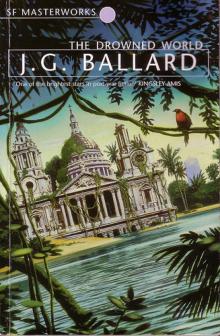 The Drowned World
The Drowned World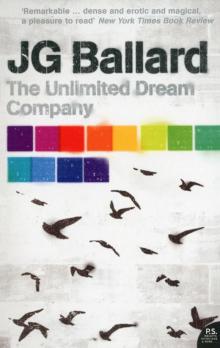 The Unlimited Dream Company
The Unlimited Dream Company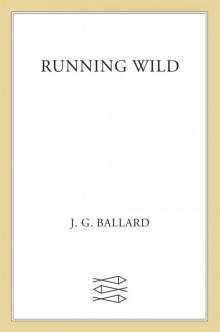 Running Wild
Running Wild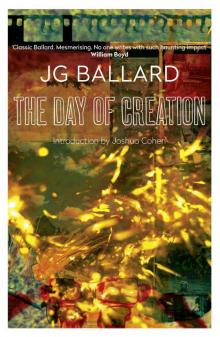 The Day of Creation
The Day of Creation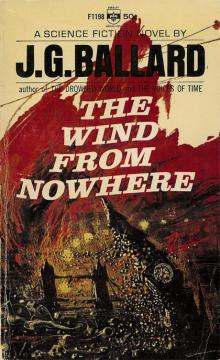 The Wind From Nowhere
The Wind From Nowhere The Complete Short Stories, Volume 2
The Complete Short Stories, Volume 2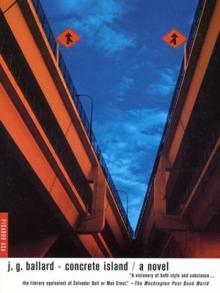 Concrete Island
Concrete Island Empire of the Sun
Empire of the Sun The Kindness of Women
The Kindness of Women Vermilion Sands
Vermilion Sands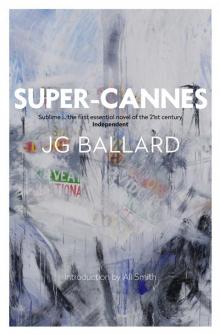 Super-Cannes
Super-Cannes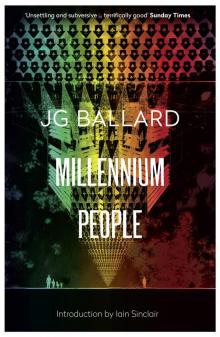 Millennium People
Millennium People The Complete Stories of J. G. Ballard
The Complete Stories of J. G. Ballard Crash
Crash The Drought
The Drought The Atrocity Exhibition
The Atrocity Exhibition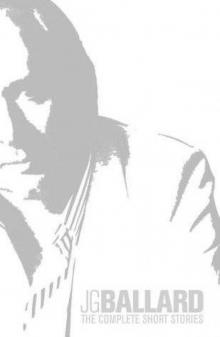 The Complete Short Stories: Volume 1
The Complete Short Stories: Volume 1 Miracles of Life: Shanghai to Shepperton: An Autobiography
Miracles of Life: Shanghai to Shepperton: An Autobiography Rushing to Paradise
Rushing to Paradise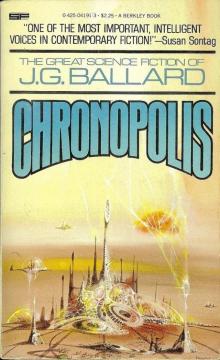 Chronopolis
Chronopolis Cocaine Nights
Cocaine Nights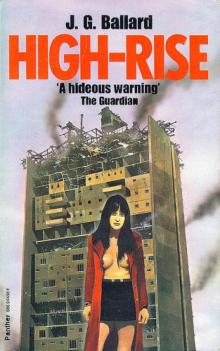 High Rise (1987)
High Rise (1987) The Complete Short Stories
The Complete Short Stories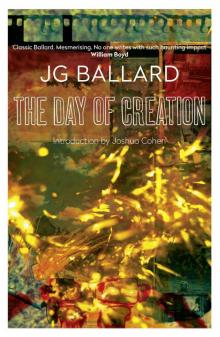 The Day of Creation (Harper Perennial Modern Classics)
The Day of Creation (Harper Perennial Modern Classics)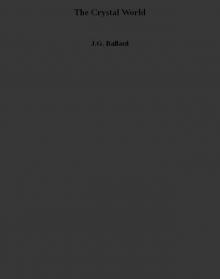 The Crystal World
The Crystal World